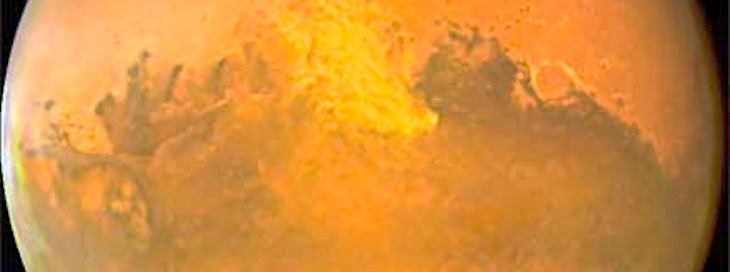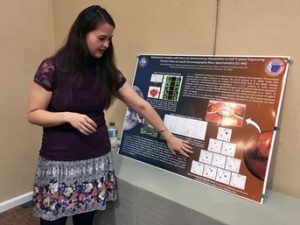Tomatoes on Mars? UALR doctoral student is trying to make it happen
by April 19, 2017 3:18 pm 562 views

When Diamond McGehee was growing up in Magnet Cove, she dreamed of being a medical doctor. Now she hopes to keep astronauts from needing to see a doctor in the cold depths of space by possibly putting something red on the Red Planet.
McGehee told Talk Business & Politics she has genetically modified anti-oxidant rich tomatoes that might help prevent cancer during a long space flight to the planet Mars.
The 27-year-old is a University of Arkansas at Little Rock student seeking her doctorate in applied bioscience. Her recent genetic research project, “Metabolomic Analysis with Focus on anti-cancerous Metabolites in InsP 5-ptase Expressing Tomato Fruits via Liquid Chromatography-Mass Spectrometry (LC-MS),” was selected by NASA as one of 10 projects nationwide exhibited March 2 at the prestigious Julius Dasch student poster presentation at the 2017 National Space Grant Directors meeting in Washington, D.C.
“I want to learn how to use the things we know about to enhance the human experience,” McGehee said.
NASA has tentatively planned a manned mission to Mars in 2030. Among the many obstacles is the enormous amount of radiation to which astronauts could be exposed. Radiation can cause cancer, and is among the health hazards astronauts will have to endure during the trip and while they are on the Red Planet.
Tomatoes are among the highest anti-oxidant foods found in nature. Anti-oxidants fight free radical cells in the body and a diet rich in anti-oxidants has proven to reduce the risk of cancer. When a tomato plant encounters stress – heat, cold, disease, etc. – it produces metabolites to help the plant cope with the stress. Rises in metabolites also raise the anti-oxidant levels in the plant, she said.
McGehee and others working on the project use genetics to raise the metabolite rates. No genes are added to the plant, but existing gene “pathways” are manipulated, she said. These artificial changes have provided encouraging results, she said.

The next step is to raise metabolite levels without the use of genetic manipulation, but that is problematic, too. Metabolite rates rise when the plant is under stress. The key is to spike the rates without causing damage or death to the plant.
“It’s a fine line,” she said.
Room will be at a premium on the craft heading to Mars, and it will be difficult to carry chemotherapy treatments and devices to administer them. The best option is to make sure the astronauts don’t get sick, she said. Once astronauts arrive on Mars, food will have to be grown on the planet. Scientists aren’t sure if the soil quality on the planet is good enough, so soil might have to be imported from Earth.
Mars has no magnetic field and a thin atmosphere. These conditions allow for high radiation levels, a danger to the people living there, and the plants that have to be grown for survival. Creating heartier plants with higher nutrient fruits will be critical to the success of the mission, McGehee said. Seeds will be brought from Earth to grow there, she added.
Her work should be translatable to other fruits and vegetables. It will also be beneficial to those who will never leave the Earth. More nutritious food and stronger plants will become valuable in the coming years as the planet’s population grows while land that can be used to grow crops shrinks.
McGehee plans to include her genetics work with her doctorate. NASA’s plans to land on the Red Planet are tentative, and a myriad of problems will have to be solved in the next decade to make it a reality. Does McGehee think one of her tomatoes will make it to Mars?
“I think it will happen during my lifetime … will I be on the rocket? Probably not. Could one of my plants? I think so,” she said.
